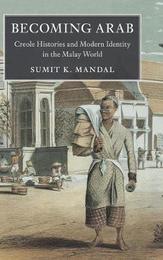
|
Becoming Arab: Creole Histories and Modern Identity in the Malay World
Hardback
Main Details
| Title |
Becoming Arab: Creole Histories and Modern Identity in the Malay World
|
| Authors and Contributors |
By (author) Sumit K. Mandal
|
| Series | Asian Connections |
|---|
| Physical Properties |
| Format:Hardback | | Pages:280 | | Dimensions(mm): Height 235,Width 156 |
|
| Category/Genre | Asian and Middle Eastern history
Colonialism and imperialism
Islamic and Arabic philosophy
Islamic life and practice |
|---|
| ISBN/Barcode |
9781107196797
|
| Classifications | Dewey:959.5004927 |
|---|
| Audience | | Professional & Vocational | |
|---|
| Illustrations |
Worked examples or Exercises; 6 Tables, black and white; 3 Maps; 15 Halftones, black and white
|
|
Publishing Details |
| Publisher |
Cambridge University Press
|
| Imprint |
Cambridge University Press
|
| Publication Date |
16 November 2017 |
| Publication Country |
United Kingdom
|
Description
Sumit K. Mandal uncovers the hybridity and transregional connections underlying modern Asian identities. By considering Arabs in the Malay world under European rule, Becoming Arab explores how a long history of inter-Asian interaction was altered by nineteenth-century racial categorisation and control. Mandal traces the transformation of Arabs from familiar and multi-faceted creole personages of Malay courts into alienated figures defined by economic and political function. The racialisation constrained but did not eliminate the fluid character of Arabness. Creole Arabs responded to the constraints by initiating transregional links with the Ottoman Empire and establishing modern social organisations, schools, and a press. Contentions emerged between organisations respectively based on Prophetic descent and egalitarianism, advancing empowering but conflicting representations of a modern Arab and Islamic identity. Mandal unsettles finite understandings of race and identity by demonstrating not only the incremental development of a modern identity, but the contested state of its birth.
Author Biography
Sumit K. Mandal is an Associate Professor in the School of Politics, History, and International Relations at the University of Nottingham, Malaysia Campus. A historian interested in the transnational architecture of Asian societies, Mandal does research on Muslim societies in the Malay world - in relation to the Indian Ocean - as well as contemporary Indonesia, Malaysia, and Singapore. His writing has appeared in Modern Asian Studies, Comparative Studies of South Asia, Africa and the Middle East, and Citizenship Studies. Previously, he worked at the National University of Malaysia and Humboldt University in Berlin, and held fellowships at New York University and Kyoto University, Japan. He is on the editorial board of Philological Encounters.
Reviews'Mandal makes an important and original contribution to our understanding of Arabs and Arabness in the Malay world, as well as to the history of colonial and postcolonial Indonesia. His lucid and accessible style makes Becoming Arab a pleasure to read. This ground breaking work will provoke various conversations that will further enrich our knowledge of the topic.' Ronit Ricci, Hebrew University, Israel 'Becoming Arab presents rich, engaging and original material on Arabs in the Malay world and makes a powerful case for deeper exploration of creole and transnational histories; it makes an important contribution to Southeast Asian history and colonial history, to the study of contemporary identity, ethnicity, and race, to understandings of the salience of race and ethnicity in the making and maintenance of modern nation states.' Iza Hussin, University of Cambridge 'It is always a delight when a path-breaking doctoral dissertation is finally published, and Sumit Mandal's thesis, completed in 1994 at Columbia University, falls squarely into this category. Many scholars working on the Hadhrami diaspora, which spread from southern Arabia all around the Indian Ocean, have referred to this legendary text, and it is a real pleasure to see it in print at last. The book is replete with fascinating biographical sketches, and there are valuable tables detailing the economic activities of Hadhrami Arabs on Java ... Cambridge University Press is to be congratulated for at last making this painstaking scholarly research available to a wider public.' William Gervase Clarence-Smith, South East Asia Research
|